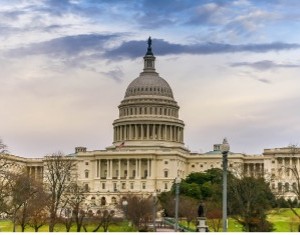Senate Begins Debate on Water Infrastructure Package
The Senate began floor consideration on the Drinking Water and Wastewater Infrastructure Act of 2021 (S. 914) this week, filing a cloture on the legislation last week. With last week’s action, it allows the chamber to move forward with a formal vote on the measure in the near future. The package enjoyed bipartisan support in the Committee on Environment and Public Works and is expected to receive a bipartisan vote on the floor.
S.914 is primarily a reauthorization bill that contains the clean water and drinking water provisions that failed to be passed last year, as part of the Water Resources Development Act of 2020. Key clean water provisions include:
- State Revolving Loan Fund reauthorized at $14 billion and provides that 10% of assistance reserved for grants and other subsidies to reduce costs.
- Wastewater efficiency grant program authorized at $100 million to support waste to energy projects.
- Alternative Water Source Act reauthorized providing $125 million to support grants to develop reclamation projects generally under $3 million.
- Sewer Overflow and stormwater grants program reauthorized at $280 million to address CSO and other overflows. 25% set aside for rural or financially distressed communities.
- Resiliency and sustainability grants assistance provided to support utilities address climate and cyber impacts. $125 million authorized.
- Small system assistance to improve the efficiency of small systems (10,000 or less) authorized. No funding level was identified.
- Workforce development grants program reauthorized at $5 million.
- Water Data Sharing program authorized to provide grants to encourage data sharing related to impaired coastal watersheds, water system with high levels of pollution and other circumstances leading to water quality impacts. Multi-state consortia authorized to enhance sharing of data, technologies, and protocols. $65 million in grants authorized to support state and consortia efforts.
- WIFIA reauthorized at $50 million per year. Renews the authority of small systems to bundle projects for WIFIA assistance to meet floor for financing assistance.
- Study required on the state of small and disadvantaged communities’ historical distribution of funding assistance and ways to improve assistance to such communities.
- The Water Reuse Interagency Working Group is created to advance water reuse throughout the country with a focus on federal agencies’ mission and ways to create opportunities for reuse.
- Advanced Clean Water Technologies Study directed to ascertain existing and future technologies that could improve the operations of treatment works.
USEPA Seeks Compromise For WOTUS
 During a House Committee on Appropriations Subcommittee hearing on the fiscal year 2022 U.S. Environmental Protection Agency (USEPA) budget request, Administrator Michael Regan fielded questions from committee members on how his Agency would handle the Waters of the U.S. rule (WOTUS). In response, Regan explained that the Agency will seek to establish a compromised regulatory path for WOTUS that balances the concerns of farmers and environmentalists. Under the Clean Water Act, WOTUS establishes the jurisdictional authority the federal government has over water bodies in the country. Over the last decade, it has been a source of contention following a rule change in 2015 that expanded the government’s jurisdictional authority of water bodies by expanding the definition of navigable waters, and recent narrowing of the rule under the Trump Administration that limited the types of navigable water bodies and reduced the authority of the government under the Clean Water Act.
During a House Committee on Appropriations Subcommittee hearing on the fiscal year 2022 U.S. Environmental Protection Agency (USEPA) budget request, Administrator Michael Regan fielded questions from committee members on how his Agency would handle the Waters of the U.S. rule (WOTUS). In response, Regan explained that the Agency will seek to establish a compromised regulatory path for WOTUS that balances the concerns of farmers and environmentalists. Under the Clean Water Act, WOTUS establishes the jurisdictional authority the federal government has over water bodies in the country. Over the last decade, it has been a source of contention following a rule change in 2015 that expanded the government’s jurisdictional authority of water bodies by expanding the definition of navigable waters, and recent narrowing of the rule under the Trump Administration that limited the types of navigable water bodies and reduced the authority of the government under the Clean Water Act.
Based on Regan’s comments, USEPA will try to craft a WOTUS rule that strikes a balance between the two prior proposed rules. Regan stated that the Agency does not “have any intention of going back to the original Obama Waters of the U.S. verbatim, and we don’t necessarily agree with everything that was in the Trump Administration’s version as well. We’ve learned lessons from both. We’ve seen complexities in both, and we’re determined that both rules did not necessarily listen to the will of the people.”




 @CASA_CleanWater
@CASA_CleanWater